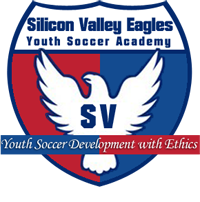SV Eagles
The Silicon Valley Eagles Soccer Academy blog is a great source of soccer coaching tips, parents and players improvement tips and advises, and updates on the soccer world news.
Questions Parents & Players should ask after Tryouts success
- Font size: Larger Smaller
- Hits: 7339
- Subscribe to this entry
- Bookmark
 It's June or January and that means tryouts for club soccer teams. There are a few select regional-quality teams that can pick and choose the cream-of-the-crop players. But in general, soccer teams are a buyer's (players/parents) market. Teams need good players more than good players need teams, and good players can exercise their power by moving to a team that closely fits their needs.
It's June or January and that means tryouts for club soccer teams. There are a few select regional-quality teams that can pick and choose the cream-of-the-crop players. But in general, soccer teams are a buyer's (players/parents) market. Teams need good players more than good players need teams, and good players can exercise their power by moving to a team that closely fits their needs.
With that in mind I have a list of questions that players and parents should be clear on before accepting a spot on a club soccer team.
I intend no disrespect to any team or club. I do think that players who are offered a spot on a team should know for sure what they are being offered. And I think most teams and coaches will be truthful and forthcoming. Most coaches really want the players to know so there are no misgivings later in the season. If the answers are vague or the team/coach doesn't respond, players and parents should take that as a warning flag and look for another club/team. The critical point is to find a team that is a good fit for you.
Here are the important areas of concern and some questions to ask.
COST:
• What is the actual overall cost of what I am signing up for?
• What does it include? Usual items included are tournament fees, state fees, referee fees, coaching and club fees? Some teams include uniforms.
• What does it not include? Uniforms, bags, warm-ups, equipment, etc.?
• Are there any unexpected fees that could come up? For example, if the majority of the team feels that they want to play in a more expensive tournament than what is budgeted, do I have any recourse other than to pay the increase?
• Are goalkeeper gloves, jersey, training included or is it to be paid out of pocket by the keeper’s parents?
• What are the expected travel expenses? (i.e. some higher level teams may rent a bus to go to a tournament or charter a plane at additional cost and players may have no choice but to contribute even if they would prefer to opt out.) Hand in hand with this goes the question of who is in charge of choosing the tournaments - coach, players, managers or parents? Are there other players to carpool with.
• Can the fees be paid over time or in installments?
• Is there any scholarship money available for players?
• Are there required fundraisers in addition to the fees? If I miss a fundraiser will I be assessed additional fees?
TEAM/COACH:
• What are the coach's qualifications and experience? Does it include experience with your age group? How long has he/she been with this club? Does he have any playing experience? What is his training philosophy?
• Who is my coach going to be? Is that a guarantee? I have a firm belief that the coach should be one of those most important factors when choosing a team. If the coach is a "coach to be assigned later" you may want to look for added assurances.
• What team am I on? Is it a Division I or Division II team? Am I guaranteed to stay on that team or is there a chance I can be moved down to a lower level team? Do I feel that the competition will challenge me to become a better player at every practice and game?
• How does the coach decide who starts?
• What is his philosophy on playing time? Some coaches only go to the bench for two or three players while others do their best to play every player. That will make a difference if you envision yourself as a starter or if you think of yourself as the 15th or 16th best player on the team. What formation (4-4-2, 4-3-3, 3-4-3, 4-1-4-1 etc.) does the coach prefer and how does that work within your strengths as a player? If you think of yourself as an outside fullback who is not comfortable attacking and the coach prefers a flat back four defense then you will have to change in order to get playing time.
• Is this a year round commitment or fall (or spring) season only?
• Are players allowed to play in other sports or is that frowned upon?
• Am I going to get to play my position (i.e. forward, goalkeeper) or am I going to play wherever the coach feels he needs me? Not an easy question but the answer can be quite telling and can go a long way not only in the satisfaction of the player and parents but also the rest of the team. Nothing stirs dissention more than parents and players who feel that a player is getting preferential treatment. Most coaches have to juggle this issue very carefully.
• Do you know who the manager is and how well do you get along with him/her? Parents often have much more contact with the manager than the coach. Is he/she well organized, accessible, e-mail or phone tree savvy?
• How many teams does this coach actually train or coach? Some coaches will take on 3, 4 or even more teams each season. The problem for their players is those coaches can’t focus 100% of their soccer attention on their team. Some clubs even take 100% of the money and gave small piece of it to the coach, you need to find out if the coach is getting paid well, to make sure he is confortable in his postion and coahcing no more than 2 teams. That means coaches with that many teams almost always have to leave practice and games early, or attend only parts of practices and games or turning some inexperienced parents to assistant coaches. Even worse, those coaches often complain about the lack of commitment of their players.
PRACTICES:
• Where, when, how often and how long do we practice? Location may be a huge factor in these days.
• Are there rules for attendance at practices?
• Will we practice with other teams in or close to our own age group? If so will there be more than one coach available (what ratio of players to coaches)? At older ages additional players (up to a limit) make practices easier and more beneficial as it's difficult to work on tactics without 15 to 16 players.
• What is the level of commitment required?
• Are there acceptable reasons (without consequences) to miss practice such as school conflicts, religious reasons, etc.?
• Is there additional goalkeeper training available and if so does it cost the goalkeeper’s additional money?
• Are coaches providing a private coaching and clinic during the off-season?
ROSTER SIZE AND PLAYING TIME:
• If I show up at all practices and do my best am I guaranteed any specific amount of playing time?
• How many players will be on the roster? As a general rule larger roster size equals more success for the team but less playing time in games. I was part of a nationwide coaches’ survey several years ago – before the current small sized rules. Coaches were asked what they considered optimum roster size for each age group. The answers and reasons given varied but the general consensus was:
- 7v7 soccer: 11 to 12 players
- soccer up to age U15: 15 Players
- U16: 15 to 16 players
- U17: 16 to 17 players
- U18: 17 to 18 players
Any more players than that and it was hard to get them all adequate playing time. Any fewer players and it was difficult to be competitive due to players missing games due to injuries or schedule conflicts.
FINALLY:
• What makes this program better than other programs? If your child is U15 or younger, don’t be swayed by state championships, etc. Those younger age championships are often won by the best athletes not soccer players. And at older ages, many of those players that are on state championship teams are recruited rather than developed (grown) by the clubs. If your aim is to move to such a team in order to win a state championship then that may be a concern. But if your aim is to get the best training possible and grow as a soccer player you may be better off on a team where you will be playing good teams but getting more playing time.
• What are the priorities of the club, team and coaches (i.e. Winning, tournaments, scholarships, teaching, developing, having fun)?
• Did the players (and the parents) on last year's team have a good experience? If a lot of players are returning, that’s usually a good sign. If there are a lot of openings on the team you should ask why. The parents and players who were on last season's team may be the best overall sources for information about the team and coach.
These questions are not meant to provide correct or incorrect answers but rather should give you a feel as to whether you or your child will be a good match for that team. You should ask open-ended questions so that you can find out truly what a team/coach/club’s philosophy is and whether that will match up well with what you think you want. If I go to buy a dog I may ask the seller, “Is this dog mean and will it bite?” The seller should tell me the truth because he does not know my intentions. If I’m buying the dog for a pet I want a docile, loving animal. But if I’m buying a dog for a guard dog I want a mean-as-asnake, junkyard dog.
You ask questions mainly to find out what the future holds rather than be surprised. Nothing ruins a good experience like a misunderstanding. Find out up-front and you and the player and the rest of the team will be better off.
To concluse, soccer is growing in The States and there are many good clubs and good coaches who love this game, they are doing an excellent job in developing kids and growing this beautiful game,







